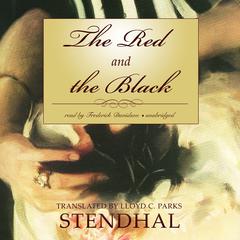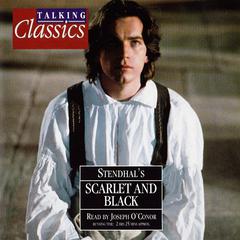 Play Audiobook Sample
Play Audiobook Sample
The Red and the Black Audiobook
 Play Audiobook Sample
Play Audiobook Sample
Quick Stats About this Audiobook
Total Audiobook Chapters:
Longest Chapter Length:
Shortest Chapter Length:
Average Chapter Length:
Audiobooks by this Author:
Publisher Description
Handsome and ambitious, Julien Sorel is determined to rise above his humble peasant origins and make something of his life-by adopting the code of hypocrisy by which his society operates. Julien ultimately commits a crime-out of passion, principle, or insanity-that will bring about his downfall. The Red and the Black is a lively, satirical picture of French Restoration society after Waterloo, riddled with corruption, greed, and ennui. The complex, sympathetic portrayal of Julien, the cold exploiter whose Machiavellian campaign is undercut by his own emotions, makes him Stendhal's most brilliant and human creation-and one of the greatest characters in European literature.
Download and start listening now!
"The Red and the Black, published in 1830, is the most famous novel by Romantic-realist and psychological author Stendhal, and not an easy one to get through in its original French! After all, Stendhal destined his small, but intensely intellectual oeuvre of novels "to the happy few," as if he knew there would be only a small number who could fully appreciate or even make their way through his lengthy and somewhat dense works. English translation, however, does do justice to this interesting psychological study of young Julien Sorel, who is born to a humble, working-class family in early 19th-century France in the town of Verriers. The title, The Red and the Black, has generally been interpreted as referring to the only two avenues open to a second or third son in a family who does not stand to inherit any family money; that is, the clergy (black) or the army (red). However, a dear friend of mine from graduate school, Cheryl M. Hansen, professor of French at Weber State University, Ogden, Utah, has written a fascinating book, Color Symbolism in the Works of Stendhal, in which she illustrates how the truly defining color in Julien's life is blue. She cites numerous references to this color in the upward rise of Julien and how this ideal blue will literally color his life's choices. Julien is indeed first slated by this family for the clergy, but he is eventually undone first by his own ambition and, ultimately, by his sentimentality; thus, the power of idealism/blue. Julien harbors an infatuation and idealized longing for a married woman, Madame de Renal. When he finally succeeds in capturing her affection, their adulterous affair ends badly, and he must flee Verrieres. The plot is complicated and includes another affair and near-marriage for Julien, when Madame de Renal comes back into his life for reasons I will not reveal. The lengthy scene toward the end of the novel when Julien languishes in prison, able to save his fate if only he will do something he cannot bring himself to do, has been compared many times to a similar scene in Albert Camus's The Stranger, which was written some 120 years later. I won't give away either ending, but I'll assure future readers that they are in for an interesting surprise in The Red and the Black that will call for some real literary-psychoanalytical discussion. The original French-language film version stars the legendary Philippe Gerard as Julien, and it is very good and true to the Stendhalian spirit. (There is also a 1997 film version I haven't yet seen)."
— Helynne (4 out of 5 stars)
The Red and the Black Listener Reviews
-
" A book to read more then one time, great! "
— Riana, 2/18/2014 -
" I laughed out loud reading it, which according to the chair of our French Department IS NOT THE RIGHT REACTION TO THIS VERY IMPORTANT WORK OF LITERATURE. "
— Simon, 2/15/2014 -
" required reading for M Guy at Bennington "
— Erika, 2/15/2014 -
" I never expected anything so it almost shocked me in the end. The novel's so powerful and subtle that I stop thinking for awhile. Then pick it up and read it again and stop thinking for more. It takes me a month to finish the book. I understand now why Nabokov said Classics is a book you want to reread. "
— Flying, 1/30/2014 -
" The best book about love and romance ever written. Its like the psychology of Dostoevsky and the wit of a frog. "
— Jarrett, 1/25/2014 -
" Me gusto, es denso, impredecible, tiene cambios de ritmo interesantes, es frio y pasional a la vez, tormentoso,los personajes perfectamente dibujados, desfilan todo tipo de sentimientos por sus paginas, me parece una novela completa. El final no decepciona. "
— Claudia, 1/19/2014 -
" Shows that human personality traits and societal situations never really change, they just take on new names. This could as easily been written today instead of 1830. Julien Sorel is one of the first (if not only) protagonists who I came to respect intellectually without altogether liking him as a (fictional) person. "
— Cathy, 1/9/2014 -
" At first, Julien Sorel reminded me of Emma Bovary: a young person from the provinces who loves to read and dreams of a better life in the big city. Then he became a kind of scheming social climber only out for himself--kind of like a 19th century equivalent of a "Bachelor Pad" contestant. Then he kind of morphed into a kind of Meursault from L'Etranger. Le Rouge et le Noir contains traces of romanticism and traces of realism; it's a psychological novel and roman d'apprentissage; it's two heavy tomes containing a little bit of everything the 19th century has to offer, really. There was more than enough there to keep me mentally engaged, but it in the end it definitely took a bit of work to make it through the whole thing. "
— Leah, 1/8/2014 -
" Was very good. Have to be in the mood to read slowly. "
— Mama, 1/2/2014 -
" I have read it four times in three years, and I enjoy it more each time. I would love to read it in French, but the Montcrief translation is pretty fantastic, hilariously formal and probably mildly censored through word choice. Has had a surprisingly profound effect on on my life. "
— Jonah, 12/12/2013 -
" A first realistic novel. Really realistic and still actual. "
— Slávek, 12/9/2013 -
" it might have been influential when it was published, but now it seems outdated. The characters are almost caricatures and do not really demonstrate the attributes of real people. On top of that I thought it was sexist. Certainly, the great romantic twist at the end didn't really make sense to me. "
— Marino, 11/8/2013 -
" I was actually surprised I got through the book. The editor refuted many of Stendhal's "facts" in the footnotes and the storyline was along the lines of a male Madame Bovary. "
— Natelle, 11/3/2013 -
" Todavia no pude delucidar el porque de la cantidad de espacios comunes a los que llevo esta lectura. "
— Günther, 10/22/2013 -
" I loved it in high school, but now all I can say is, "what was I thinking?" "
— MJ, 10/11/2013 -
" Read while very young and found it a gripping, dense, moving narrative. Too bad he died young. "
— Patrick\, 10/11/2013 -
" Skillfully written, but not that endearing. The main character is extremely unattractive. "
— Landismom, 8/17/2013 -
" I love this book. At first it's dense and difficult, but the prose is so beautiful and engrossing, it's impossible not to be inspired. Someone once said that my writing reminded them of Stendahl, and it was the biggest boost to my ego! "
— Bill, 5/27/2013 -
" So far, the best translation, but I'm still looking. Any recommendations? "
— Paul, 4/13/2013 -
" A great novel revolving around early 19th-century class society in France, and the hopes, promises, and dangers contained therein. Stendhal has more of a unique writing style: clear, unambiguous, and effective. "
— Kurt, 3/24/2013 -
" This was surprisingly good - and quite dishy. Full of romance, scandal and surprises, not at all stuffy like we expect classic literature to be. "
— Wren, 3/2/2013 -
" The Red and the Boring. "
— Ruth, 2/3/2013 -
" I read this for book group. I'm glad I read it. I had always wanted to read Stendahl, but I didn't love it. The book group was also tepid about it. "
— Marisa, 1/16/2013 -
" Review to follow when I have a chance... "
— bookyeti, 12/14/2012 -
" Julien, I would have lived and died almost exactly as you did. I don't like you too much but I have a lot of sympathy for you my friend. I admire your impulsiveness but I treasure Mathilde's loyalty to you. She is special and you can not help but to sob with her and his head... "
— Alex, 11/7/2012 -
" 3.5 but closer to 4 than 3 stars. More fun than I'd expected from such a book:) The scene where he uses someone else's letters to court a woman was hilarious! "
— Fani, 10/3/2012 -
" It's snappy and smartly unromantic. People who think the Charterhouse of Parma is better are wrong, although it's also great. This is just so brief and sharp in comparison. "
— Hillary, 9/19/2012 -
" I'll review this great book later, when I'm not feeling so flippant... "
— Pierre, 9/12/2012 -
" It took me five years to get past the first 150-200 pages. "
— Danica, 7/14/2012 -
" Only reading Le Rouge et Le noir--slow going--obsessive detail "
— Mina, 5/10/2012 -
" I read this in college. I remember having to speak to the professor about my paper because I interpreted some details in a very unconventional way (taking something absurdly literally). I got a C on the paper. I'm thinking about re-reading the book. "
— Andrew, 3/22/2012 -
" a masterpiece :) "
— Angie, 1/19/2012 -
" probably the best read ever for me------read over the course of two years travelling on the GO Train to work, and subsequently, BC Transit Bus. Enjoyed the introspection and philosophizing of Julien Sorel. "
— Trevor, 12/27/2011 -
" probably the greatest novel ever written that isn't a household name. "
— Ian, 11/29/2011 -
" Al Gore's favorite book - that explains a lot right there! "
— Kate, 9/9/2011 -
" Soo boring "
— Denisa, 6/27/2011 -
" This book was not easy to digest. However, I read it along with the English translation in Audiobook format. The story was enjoyable but well but Mister Sorrel was exhausting at times. I will try other French writers that are easier to understand. "
— Carlos, 6/6/2011 -
" It took me five years to get past the first 150-200 pages. "
— Danica, 5/25/2011 -
" Great book. Fast-paced, incisive, exciting, sprawling, sloppy, brilliant. "
— Taylor, 5/23/2011 -
" Great book. Fast-paced, incisive, exciting, sprawling, sloppy, brilliant. "
— Taylor, 5/23/2011 -
" Stendahl didn't like the aristocracy or the clergy. And he thought ambition was a no-win way to behave. "
— Bill, 4/10/2011 -
" Stendahl didn't like the aristocracy or the clergy. And he thought ambition was a no-win way to behave. "
— Bill, 4/10/2011 -
" Like this reader, Julien Sorrel is a fool, a hypocrite, and melancholic. Stendhal manages to make everyone and everything seem bovine. Thumbs up! "
— Mpho3, 4/3/2011 -
" Like this reader, Julien Sorrel is a fool, a hypocrite, and melancholic. Stendhal manages to make everyone and everything seem bovine. Thumbs up! "
— Mpho3, 4/3/2011 -
" This is the book that I got me hooked in French Literature. Ended up majoring French Literature in college back in Japan many many years ago. "
— Maki, 2/23/2011 -
" This is the book that I got me hooked in French Literature. Ended up majoring French Literature in college back in Japan many many years ago. "
— Maki, 2/23/2011 -
" I believe this is Stendhal's best book - beautifully written and great subject matter. "
— Sara, 2/20/2011 -
" I believe this is Stendhal's best book - beautifully written and great subject matter. "
— Sara, 2/20/2011
About Stendhal
Stendhal, the pen name of Marie-Henri Beyle (1783–1842), was a nineteenth-century French writer. Known for his acute analysis of his characters’ psychology, he is considered one of the earliest and foremost practitioners of realism in his two novels, Le Rouge et le Noir (The Red and the Black, 1830) and La Chartreuse de Parme (The Charterhouse of Parma, 1839).
About Davina Porter
Davina Porter has been enthralling listeners for over twenty-five years with her ability to mine the psychological depths of the characters she reads and bring them convincingly to life. In 2006, she won the prestigious Audie Award for Best Female Narration and in 2004 for Best Inspirational Literature Narration. She has been honored as an AudioFile Golden Voice and has won nineteen AudioFile Earphones Awards. As an actress, she has appeared on stage at the Vineyard Playhouse and the Square One Theater, among others.



























